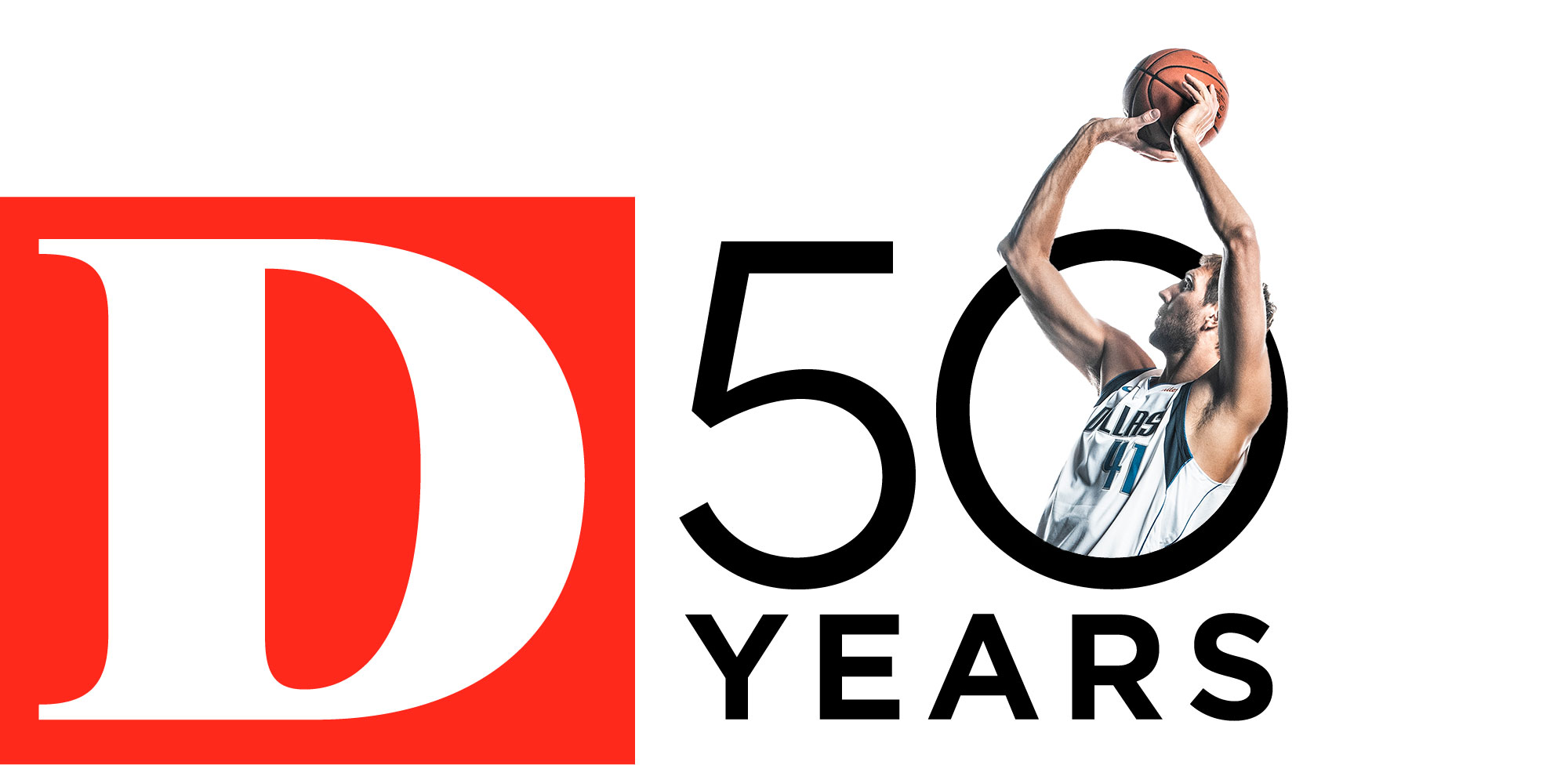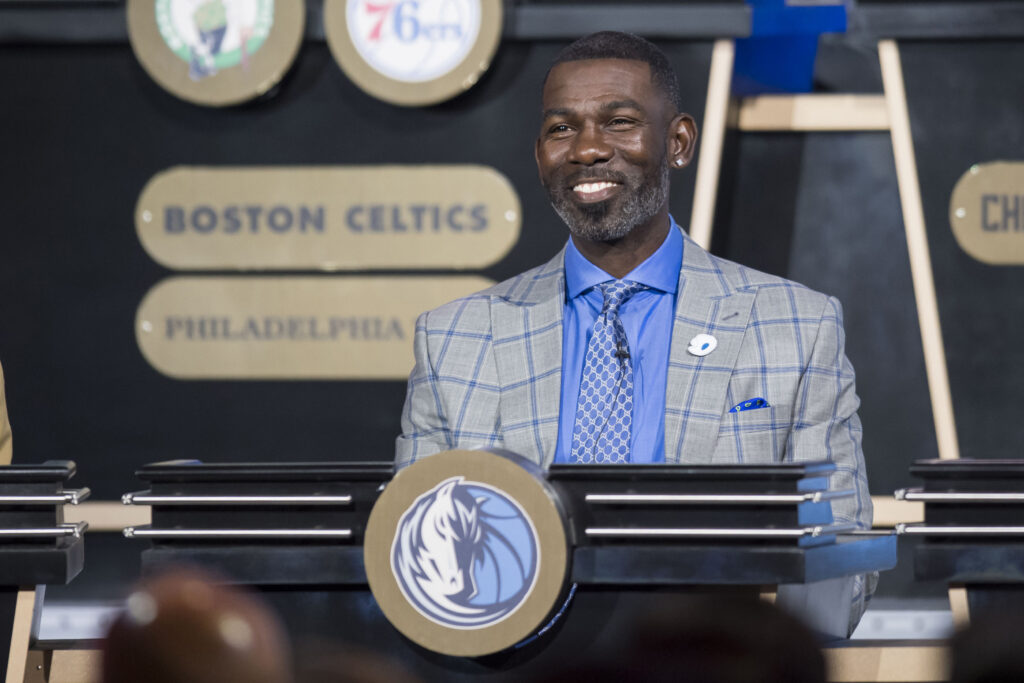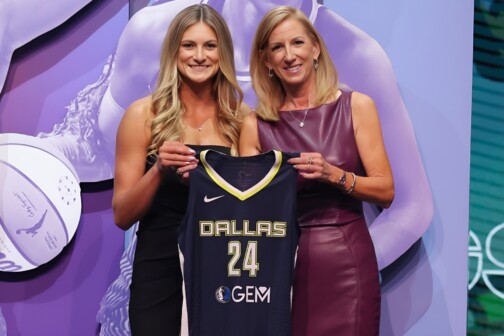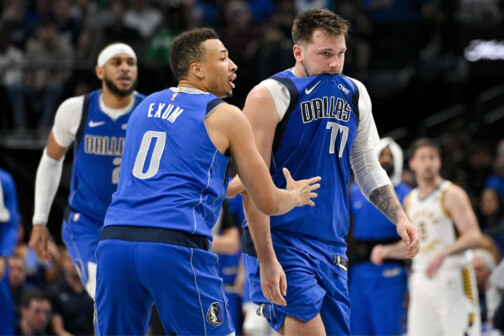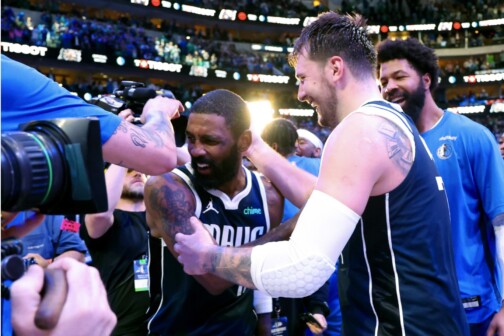A banner bearing Dirk Nowitzki’s No. 41 finally hangs in the American Airlines Center’s rafters. If that honor feels overdue, it’s only because his significance to Dallas and the Mavericks is such that his number could have been retired any time after he brought the organization its first NBA championship. Dirk’s latest moment of glory was inevitable, as is each successive one—a statue outside the building, a slot in the NBA Hall of Fame—because he spent 21 years as a stat-spewing locomotive churning down the tracks from one NBA city to the next. The sheer volume of accolades would matter for any franchise but especially this one, a team that never fielded a player close to his caliber before and will never field another one who matters in quite the same way. They could have retired his number midway through a playoff game he was competing in, and everyone in town would have endorsed the move.
So, hell yeah, hang No. 41 high. It was time, even if the wait was hardly cosmic injustice. That better applies to Michael Finley, who also deserved the honor a long time ago.
Retiring numbers is an inherently subjective exercise. The Mavericks’ standards are not the Cowboys’ standards, which are not the Stars’ or the Rangers’. For that matter, the Mavs’ standards don’t seem to be anyone else’s standards. The quartet who currently hold the honor range from one of the 20 greatest players in league history (Dirk) to one of the better players of his era (Rolando Blackman) to a very good starter (Derek Harper) to a role player in the right place at the right time (Brad Davis). That breadth makes it possible to imagine a narrative for any number of players to join them, be it for statistical achievements (Mark Aguirre), a key role on winning teams (Jason Terry), stature within the sport (Jason Kidd), or longevity and likability (J.J. Barea).
Finley was the best blend of everything, which gives him the best case of everyone.
I argued for the retirement of his number all the way back in 2011, the year after he retired, and the argument has only grown stronger since he rejoined the team in a front-office role. The latter might mean the most to Mark Cuban, who provided a glimpse into his criteria Wednesday when told The Ticket that “guys who wanted to leave are going to have a harder time than guys who made the effort to stay.” Finley didn’t leave the Mavericks by choice during his playing days; he was waived via an amnesty clause that allowed the team to avoid paying luxury taxes on his contract. Now he’s back where he was at his best, doing his part to try and help the organization secure the championship ring he had to find in San Antonio after his departure.
To be clear, this almost certainly will happen eventually. Finley’s No. 4 was last issued in 2017, and one-time presumptive franchise savior Dennis Smith Jr. was later denied the opportunity to wear it the following season, after Dallas drafted him ninth overall. When the team’s highest-picked player in nearly a decade and a half, whose Twitter handle at the time was @Dennis4Smith, is told to kick rocks, it’s hard to imagine anyone touching Finley’s number again.
So what’s the holdup? Our country is a dark place growing increasingly bleaker, a smoking cauldron of metaphorical political rot and literal human disease. Our planet, groaning and struggling under the strain of generations of neglect, could someday buckle entirely from the environmental residue of a Ponzi scheme trafficking in badly drawn JPEGs. The point is, we are promised nothing, so let’s celebrate the good stuff whenever we can.
And Finley’s time in Dallas was unassailably good. There was his body of work, sure, between a pair of All-Star appearances and sufficient offensive fireworks to keep him in the top half-dozen of every relevant scoring category in the franchise’s record books despite leaving town all the way back in 2005. But his story was more about when and how he plied his trade. Finley was 23 years old when he arrived in Dallas in 1996 and 32 when the team released him, and so he spent the best years of his career as the scaffolding for the Dirk era, shouldering the load when things were awful, then good, only to get pushed out when the Mavericks began flirting with greatness. He led the league in minutes three times between 1997 and 2002, his legs racking up mileage for mostly doomed causes—Dallas went a combined 60-104 in the first two of Finley’s minutes-leading campaigns—while ceding more and more status to Nowitzki along the way. As Dirk reminded the American Airlines Center crowd during the postgame ceremony, his career as we know it does not happen without Finley helping shepherd him from an overwhelmed teenager in a foreign country to leader of a championship team. Left unsaid was something even more important: Finley not pulling rank or throwing tenure around when Nowitzki began to surpass him, gracefully navigating the sort of fragile transition that has shattered countless promising rosters throughout NBA history.
For those efforts, Finley was well-compensated, but he has received comparably little in the way of public appreciation. Such is the business of sports. Yet if last summer’s internal overhaul taught us anything, it’s that the Mavericks operate on plenty of sentiment, too, between Kidd replacing Rick Carlisle as head coach, fellow 2011 title-winner Tyson Chandler and J.J. Barea back as a player development coaches, Finley serving as vice president of basketball operations, and Dirk lugging around a special advisor title that’s mostly a placeholder until he settles on his post-playing future and the right time to pursue it. Whatever its foibles, this is an organization that takes care of its own, which ought to grease the wheels toward Finley’s ceremony happening sooner than later.
Not that there’s any telling how long this takes. Harper didn’t get his moment until 2018, 21 years after he’d left Dallas for the second time. Finley is more than halfway there, and while it’s hard to imagine his wait stretching quite that long, it’s probably safe to rule out this season at minimum now that Dirk’s gotten his. So on it goes, no end date in sight. It won’t be the first time Finley warranted a little more than he’s gotten. But it’ll happen someday, no matter how slow time has been getting on his side.
Get the ItList Newsletter
Author

